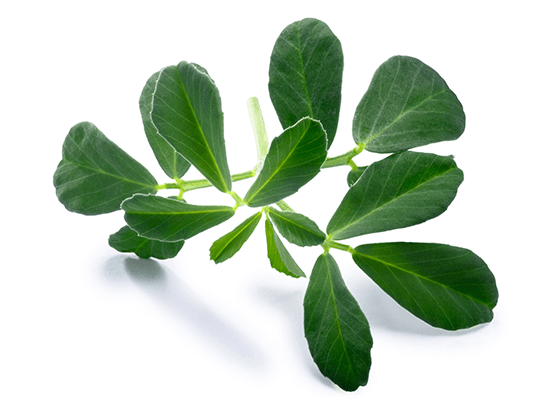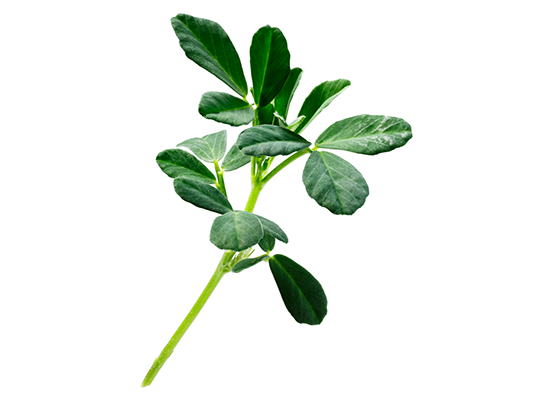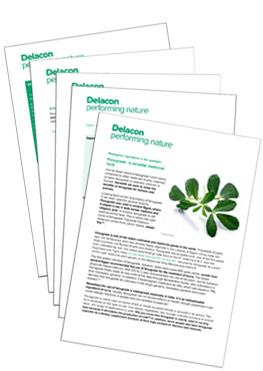Fenugreek – a versatile plant in animal feed (part 4)
As you have already read in part 1 and part 2, Fenugreek is an ancient cultivated plant with a lot of beneficial properties. With its vast modes of action, it influences the organism of humans and animals in multiple ways. That means, fenugreek is not only a valuable foodstuff, but also a corrective in the glucose metabolism and can support maintenance of intestinal health. In this last part of our phytogenic series on fenugreek, we want to take a closer look at the antioxidant properties of its active ingredients. Stay curious...
Discover more benefits of fenugreek

Anti-oxidative effects of fenugreek
Fenugreek has anti-oxidative properties (Kaviarasan et al., 2007; Sinduhu et al., 2012). This means that the bioactive compounds of this plant can support to balance oxidative processes in human and animal bodies.
Although oxidative processes are necessary for ordinary function of our metabolism, they need to be balanced. So called oxidative stress is detrimental.
Oxidative stress occurs, if there is an imbalance between the occurrence of oxidants (also called reactive oxygen species) and the ability of the bodies’ antioxidant defense system to detoxify these oxidants or repair damage caused by them.
It is associated with some diseases (cancer, disorders of the immune system or rheumatic diseases) and premature ageing, as it affects the repair and detoxification function of cells.
Did you know?
The anti-inflammatory effects of purified fenugreek seed extract in various concentrations (5-40 mg/kg body mass) were tested in mice and compared to the analgesics diclofenac and pentazocin.
In their study, Vyas et al. (2008) found that at a dose of 40 mg/kg fenugreek seed extract, decreased the pain response by 75%, after chemical or thermal provocation In contrast, the administration of diclofenac reduced the pain expressions by 63%. In addition, an acute inflammatory reaction was observed, which was accompanied by the production of prostaglandin E2 and prostaglandin 2α.
The authors therefore assumed that treatment with fenugreek seed extract suppresses the formation of these substances or leads to an antagonistic effect. Furthermore, the authors suspected that fenugreek seed extract has a centrally mediated pain-relieving effect (Vyas et al., 2008).
In a further study, the influence of fenugreek seed on the immune system of mice was tested. Three different concentrations (50 – 250 mg/kg body mass) of a fenugreek seed extract were fed. The authors observed an increase in the humoral immune response, an increased cell-mediated immune response and an increased phagocytic capacity.
Including previous studies, it was assumed that the components responsible for the increased immune response are probably saponins, flavonoids and fibre components (Bin-Hafeez et al. 2003).

Short Facts – Fenugreek
- The liver benefits from the dietary intake of fenugreek seeds because they have a positive effect on bile formation and bile flow and – presumably by regulating cholesterol metabolism – they may help to reduce the formation of gallstones (cholesterol stones)
- Fenugreek seeds also have a gastroprotective effect. The mucus fraction of fenugreek seeds has been found to be superior to omeprazole (proton pump blocker) in the prevention of gastric mucosal ulcerations. In rats, aqueous extracts promoted the healing of stomach ulcers.
- Fenugreek seeds are considered worldwide to be the most important herbal galactagogue for humans and animals. They promote the growth of the mammary gland and significantly increase the amount of milk. This could be proven for humans, but also for goats, cows, buffalos and other animals. It has been shown that human infants lose significantly less weight after birth and regain their birth weight more quickly when their mothers drink fenugreek tea
References upon request
Do you want the entire article as PDF including all references?

You are only one click away.

Anne Oberdorf
Anne has always been fascinated by the unknown, the diversity and beauty of nature. Her love for nature brought her to Delacon in 2018 after studying agricultural sciences, where she worked as Technical Communications Manager and later as Product Manager Aquaculture. Since February 2021, she has been taking a new, natural career path outside of Delacon.










